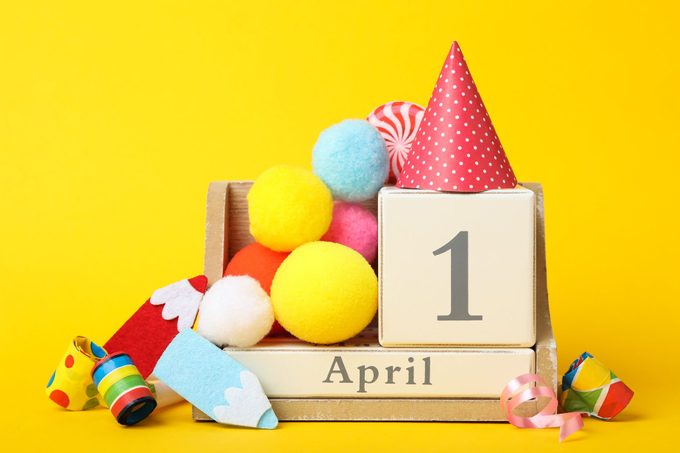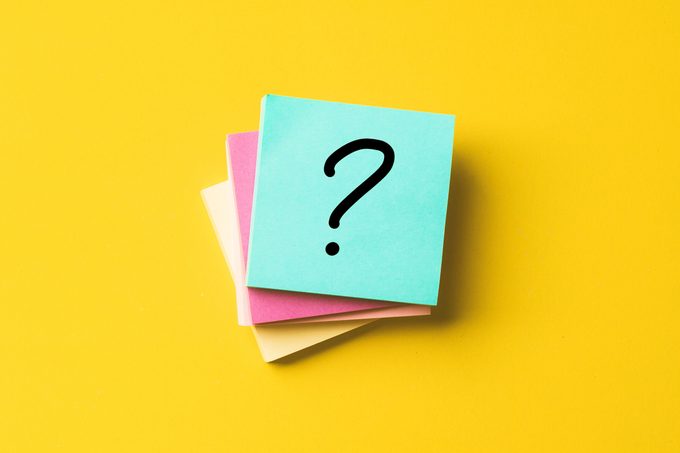It's possible that the entire concept of April Fools' Day is itself a prank. Or is it?

April Fools’ Day: How Did It Start, and Why Is It April 1?

We all know and love April Fools’ Day—a day dedicated to pranks, surprises and harmless mischief. Whether it’s tricking your friends, pulling a fast one on family, or setting up the ultimate office prank, it’s all in good fun. But have you ever stopped to wonder … where did April Fools’ Day even come from?
If you’re as curious as we are, we’ve dug into the origins to give you a deeper look at how this legendary prankster holiday began, including where the name came from and some of the earliest written mentions of it.
So, if you love a good prank and can’t wait for April 1st to roll around, keep reading! Knowing the history might just make your April Fools’ tricks even more fun to pull off.
Get Reader’s Digest’s Read Up newsletter for more holidays, humor, cleaning, travel, tech and fun facts all week long.
What is April Fools’ Day?
April Fools’ Day is an annual holiday that consists of practical jokes, pranks and hoaxes. Pranksters often unmask their joke by yelling a loud and proud “April Fools’!” at their victim. This custom has been observed for hundreds of years, but more on that later.
Is April Fools’ Day a holiday?
April Fools’ Day is technically considered a national holiday (though not a federal one) in the United States.
When is April Fools’ Day 2025?

April Fools’ Day always occurs on the first of April. In 1561, a Flemish poet wrote some comical verse about a nobleman who sends his servant back and forth on ludicrous errands in preparation for a wedding feast. (The poem’s title roughly translates to “Refrain on errand-day / which is the first of April.”) The first mention of April Fools’ Day in Britain was in 1686, when biographer John Aubrey described April 1 as a “Fooles holy day.”
It’s clear that the habit of sending springtime rubes on a “fool’s errand” was rampant in Europe by the late 1600s. On April Fools’ Day in 1698, so many saps were tricked into schlepping to the Tower of London to watch the “washing of the lions” (a ceremony that didn’t exist) that the April 2 edition of a local newspaper had to debunk the hoax—and publicly mock the schmoes who fell for it.
What is the origin of April Fools’ Day?

There’s no question that April Fools’ Day is one of the most widely recognized non-religious holidays in the Western world. Children prank parents, co-workers prank co-workers, and yes, national news outlets still prank their readers. But why? What is the origin of April Fools’ Day, and how did it become an international phenomenon?
The totally legit, not-pulling-your-leg answer to the origin of April Fools’ Day is: Nobody really knows.
One likely predecessor to the origin of April Fools’ Day is the Roman tradition of Hilaria, a spring festival held around March 25 in honor of the “first day of the year longer than the night” (to us, the vernal equinox, which falls around March 20). Festivities included games, processions and masquerades, during which disguised commoners could imitate nobility to devious ends.
It’s hard to say whether this ancient celebration’s similarities to the modern April Fools’ Day are legit or coincidence, as the first recorded mentions of the holiday didn’t appear until several hundred years later.
Why is it called April Fools’ Day?
Though the exact origins of April Fools’ Day remain a mystery, the name likely comes from the tradition of playing tricks on April 1st. The word “fool” refers to someone who has been deceived, and since pranks are the hallmark of the day, it seems natural that it would become known as April Fools’ Day.
However, one of the earliest written mentions of the holiday comes from John Aubrey in 1686, who called it “Fooles Holy Day” in his notes on English customs. Later, an excerpt from a 1708 letter to Britain’s Apollo magazine asked the same question: “Whence proceeds the custom of making April Fools?”
Is April Fools’ Day celebrated worldwide?

Many other countries have adopted the idea of playing pranks on or around April 1. For example, France celebrates April Fools’ Day on April 1 by sticking a paper fish onto the backs of as many people as possible while yelling, “Poisson d’Avril!” This tends to be something children partake in more than adults.
In Greece, successfully tricking someone on this day is said to bring the prankster good luck for the entire year. In some parts of the country, rainfall on April 1 is said to have healing abilities. While neither of these countries celebrates April Fools’ Day quite like the United States, they still have their own methods of tricking people.
What are some famous April Fools’ Day pranks?
Some media outlets and fast-food chains have gone all out to weave elaborate April Fools’ Day hoaxes. Here are four that might make you laugh:
- In 1957, the BBC perpetrated the “Spaghetti Tree Hoax,” during which the U.K. network broadcast images of Swiss women casually “picking” spaghetti from trees and bushes during their annual harvest.
- In 1992, National Public Radio pulled a jaw-dropper, featuring a spot with former president Richard Nixon claiming he was running for president again. Plot twist: It was an actor, not Nixon, and the whole thing was a prank that caught the entire country off guard. April Fools’ Day magic at its finest!
- In 1996, Taco Bell declared they’d bought Philadelphia’s iconic Liberty Bell and had grand plans to rebrand it as the Taco Liberty Bell.
- In 1998, Burger King decided to toy with reality. They unleashed an ad for the “Left-Handed Whopper,” and guess what? Confused customers flooded in, actually asking for this imaginary sandwich.
Why trust us
At Reader’s Digest, we’re committed to producing high-quality content by writers with expertise and experience in their field in consultation with relevant, qualified experts. We rely on reputable primary sources, including government and professional organizations and academic institutions as well as our writers’ personal experience where appropriate. We verify all facts and data, back them with credible sourcing, and revisit them over time to ensure they remain accurate and up to date. Read more about our team, our contributors and our editorial policies.
Sources:
- BBC News: “Is this the best April Fools’ ever?”
- Sir Henry Ellis: “Popular Antiquities of Great Britain: Faiths and Folklore; a Dictionary of National Beliefs, Superstitions and Popular Customs, Past and Current, with Their Classical and Foreign Analogues Described and Illustrated, Volume 1″
- Museum of Hoaxes: “The Washing of the Lions”
- History: “April Fools’ Day”
- Library of Congress Blogs: “April Fools: The Roots of an International Tradition”





















